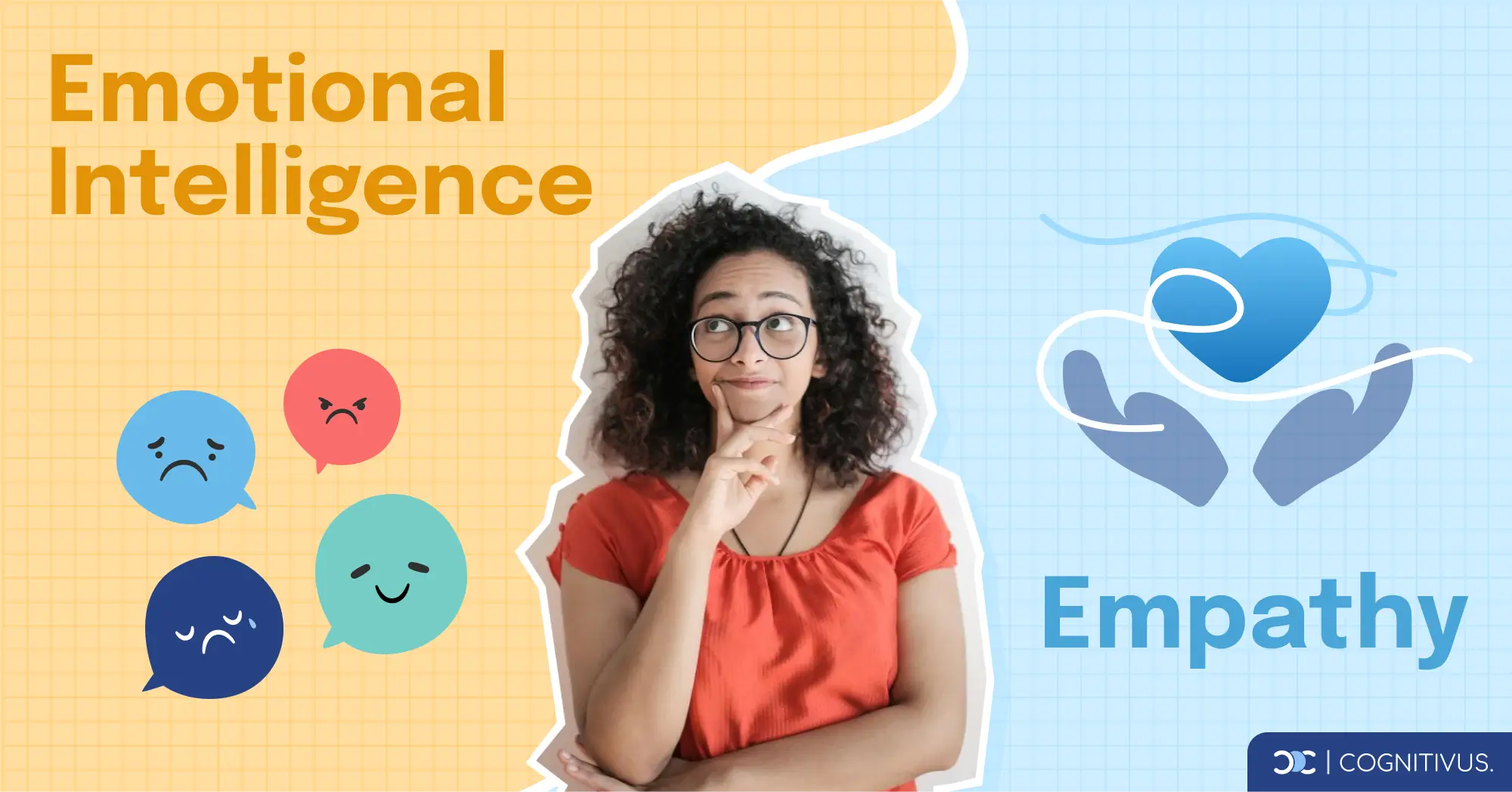The ability to share someone else’s emotions or “step into their shoes” has always been recognized as having empathy. But many of us use the terms “empathy” and “emotional intelligence” interchangeably because we believe they mean the same thing.
We know that being emotionally intelligent means that you can empathize with others, but there’s a lot more to emotional intelligence, or EQ than meets the eye. So, to better understand what EQ is, this guide looks at the differences between emotional intelligence and empathy, how EQ influences your life, and the steps you can take to become a more empathic and emotionally intelligent person.
1. Is Empathy Part of Emotional Intelligence?
How empathy relates to emotional intelligence
It’s easy to confuse empathy with emotional intelligence. After all, someone who is described as an empath is also considered emotionally intelligent, so what exactly is the difference and how do they overlap?
Emotional intelligence is defined as the ability to identify how you feel and then positively handle those emotions, whether it’s fear, anxiety, or sadness. It consists of a few components, including self-awareness, self-regulation, empathy, as well as social skills such as leadership and communication, and motivation. Note that Emotional Intelligence is sometimes called Emotional Quotient (EQ) interchangeably, although there’s a small difference between the two.
If we break these components down, we see that self-awareness is about understanding your emotions, whereas self-regulation involves managing those emotions. In this instance, motivation associated with EQ is not about chasing wealth or status but involves intrinsic motivation, in which you prioritize happiness to feel satisfied in life.
Empathy, on the other hand, is described as sharing the emotions of another person because you can see or experience a situation from their perspective. In other words, you can put your own emotions aside and show kindness by relating to what someone else is going through. In short, empathy is about your emotional response to another person’s emotional state.
Now that we understand the difference between empathy and emotional intelligence, let’s see how they overlap.
According to a group of researchers from the University of Thessaly, empathy is the foundation of emotional intelligence. It influences how we perceive and treat other people, and this is important in interpersonal interactions, particularly in healthcare settings. Empathy helps us understand and share another’s experience, which makes communication clearer and allows us to build deeper connections.
For example, have you ever heard the phrase “putting yourself in someone else’s shoes?” It means that you can see the other person’s point of view as if you were that person. To do this, you must have empathy. But you also need emotional intelligence. This goes beyond just sharing someone else's emotions. It is about controlling your own feelings. You learn how to respond to others' emotions effectively. Emotional intelligence helps you handle social situations with care and keeps you steady even when stress levels rise. It also helps you form strong bonds with others. With both empathy and emotional intelligence, you can fully understand someone else's view, and connect with them in a way that is both insightful and positive.
How empathy contributes to your overall social skills
To better understand how empathy relates to the way we engage with others, we first need to know what social skills are. Social skills consist of the verbal and non-verbal gestures that you use to communicate with someone. Assertiveness, active listening, recognizing body language, and empathy are all examples of social skills.
So when you have a good grasp of empathy, it means that you’re able to build authentic connections and trust with others. Without using words, the more you can comprehend and reflect their emotions, the more you show the other person that you value their feelings and perspectives. This forms the cornerstone of any strong relationship, but how does it contribute to your overall social skills?
According to a study measuring social skills and emotional empathy, a strong correlation between the two competencies revealed that empathy should be seen as a necessary part of basic communication. So, when it comes to social skills, whether personally or professionally, empathy helps you communicate with and relate to others, which builds trust. When you have trust, you can establish meaningful connections and lasting relationships because you truly understand the other person.
Empathy vs self-awareness
Being self-aware means that we can identify how we feel in any context. So, for example, if you find yourself getting impatient or wanting to lash out, you know that your anger and frustration are getting the better of you. Because you’re self-aware, you can take a step back and control your emotions before they create conflict or offend someone.
Over time, your ability to identify the thought patterns and feelings that trigger certain behaviors or reactions can help you better control your emotions.

But how does this relate to empathy? Well, if you don’t have self-awareness, a building block of emotional intelligence, you’ll find it challenging to empathize with someone else. That’s because you need to understand your own emotions before you can recognize and resonate with someone else’s. Communication that is influenced by empathy and refined by emotional intelligence offers a powerful tool that can support people in different contexts. This means that you will know how to respond to someone in complex social situations based on your level of sincerity and interest in what they say.
2. How Do Emotional Intelligence and Empathy Impact Our Lives?
Emotional intelligence at work
To succeed at work or in personal relationships, you need to be emotionally intelligent. That’s because your EQ guides your communication with others, and in turn, helps you connect with the people around you. In the workplace, emotional intelligence takes center stage as it affects your daily interactions with your co-workers, from managing teams to making vital decisions as a project leader.
Think about this; leaders with high EQ can identify their employees’ emotions, which allows them to create environments where motivation and morale are high. When conflict arises, which is inevitable in the office, your emotional intelligence can help you view the situation from different perspectives, making it easier to come to a resolution that respects everyone’s feelings.

Hence this shouldn’t be a surprise that EQ accounts for almost 90% of what sets high performance leaders apart from their peers with similar technical skills, as reported by Harvard Business Review.
Emotional intelligence at home
Having a strong sense of emotional intelligence can go a long way toward managing the dynamics in your household. By understanding someone’s emotional state, you can read non-verbal cues, such as body language. This can mean the difference between creating a nurturing environment and one in which you constantly misunderstand one another.
All you have to do is apply the principles of EQ, such as empathetic listening and self-regulation so that you can address the emotional needs of those closest to you. At the same time, these principles will help you manage your own feelings constructively. If anything, emotional intelligence allows you to lead by example by teaching others these valuable life skills.
The power of empathy in building connections
We know that empathy helps us relate to others, but how exactly does it help us build deep and meaningful connections? Remember that empathy is about more than identifying another person’s emotions. It’s about sharing their story and experience with them.
Empathizing with someone’s situation can build an emotional bond that says, “I understand not just what you're feeling, but why you feel that way." It is such a powerful connection because it creates trust, deepens a relationship, and fosters a sense of belonging. It’s that incredible feeling of unconditional love and support that, no matter what, there’s someone in your corner who wholeheartedly understands you.
Think about the way you perceive your colleagues in the workplace. If you lacked empathy, it would be hard for you to see them as regular people who have lives outside of the office. But when you have empathy, you can better understand where they’re coming from or why they think the way they do. You can work towards building loyalty, improving cooperation, and possibly driving the entire team to new heights by adopting this approach.
As Forbes suggests, cognitive compassion, which is a combination of empathy and emotional intelligence, helps to develop strong and motivational leadership that balances understanding with action and progress. People respect and value you because you respect and value them, and that is the power of empathy in building connections.
The powerful combination of emotional intelligence and empathy
Empathy is where it all begins. It's the ability to truly understand and share the feelings of another. This understanding is crucial, not just in personal relationships, but also in professional settings. Without empathy, genuine connections are hard to come by. It's really fundamental.
But there's more to the story and this is where emotional intelligence (EI) comes in. EI builds on empathy. It's about managing your own emotions and navigating those of others with wisdom. Dr. Kathleen M. Costello, a clinical psychologist, highlights its significance. She emphasizes that emotional intelligence, grounded in empathy, is especially critical in leadership. Leaders with EI can inspire teams, fostering a spirit of cooperation and motivation. Without it, teams may struggle with low morale. People want to feel heard and valued.
Together, empathy and emotional intelligence create a powerful synergy. This combination is not just beneficial; it's transformative. It leads to lasting relationships, both personally and professionally. It helps us overcome challenges. With EI and empathy, we build support networks that can carry us through life's ups and downs. Such synergy is the cornerstone of a fulfilling journey.
3. Improving Your Emotional Quotient and Empathic Abilities
We know that developing empathy and emotional intelligence can significantly improve our personal and professional relationships. In the workplace, it creates sympathetic leaders and harmonious teams. It can also help us become better friends, spouses, and parents because we’re equipped to control our emotions and validate those of others.
Based on the benefits of empathy and EQ, I’m sure you want to know how you can enhance these abilities in your own life. Let’s take a look at the ways you can improve your empathy and emotional intelligence.
How to develop your emotional intelligence
The good news is that emotional intelligence is a flexible set of skills that you can learn and improve. So, where do you start?
The first step is to build a strong sense of self-awareness. You can do this by paying careful attention to your feelings and reactions in certain situations. When you feel triggered by something, think about why you’re experiencing such intense emotions in those moments. It’s a good idea to reflect on your feelings and behavior because it can help you develop insight.
Additionally, the words you use can significantly impact your emotional intelligence; avoid negative and low EQ language and instead choose words that promote understanding and empathy.
Another important aspect of EQ is self-regulation. I know many people who’ve transformed their lives by paying attention to their moods and learning to control their emotional impulses.

Let’s look at the example of feeling frustrated and overwhelmed. When you’re at the end of your tether, you become reactive, which can lead to emotional outbursts. As soon as you feel this type of stress and pressure mounting in conversation with someone, take a deep breath and walk away if you have to. Give yourself time to think about your response. Maintaining your composure can prevent conflict from escalating and keep those around you calm at the same time.
If you find it hard to determine whether your reactions are problematic or your emotions are difficult to control, ask for feedback from friends and family during social interactions. An outside perspective can reveal behaviors that you might overlook. But remember to accept this type of feedback with a positive mindset of personal growth rather than become defensive about it.
An interesting piece of research published in the International Journal of Caring Sciences has explained the benefits of developing and strengthening these abilities, particularly in the healthcare setting. It found that empathy and emotional intelligence lead to effective communication and better patient outcomes because the staff was more attentive to the needs of the people who depended on them.
How do you increase empathy levels?
If you want to increase your level of empathy, you’ll need to focus on understanding and sharing the feelings of others.
Start by honing in on your listening skills. Actively listening to someone else, without disrupting them, judging them, or responding without thinking can encourage deeper understanding.
You can also determine someone’s emotional state by focusing on non-verbal signals. Body language and tone of voice often convey what words cannot, so focus on these when interacting with someone.
The most challenging step is trying to view situations from others’ perspectives. You can do this by imagining what it would be like if you were in their position and facing their circumstances. The purpose is to resonate with their experiences.
When you make the effort to practice self-awareness, self-regulation, and activities that can improve your understanding of others’ emotions, you can significantly transform your life. And while empathy is about pinpointing how you feel, and relating to others in times of sadness, anger, or uncertainty, never forget that it’s also about sharing your own happiness and success with the people you trust and respect.


